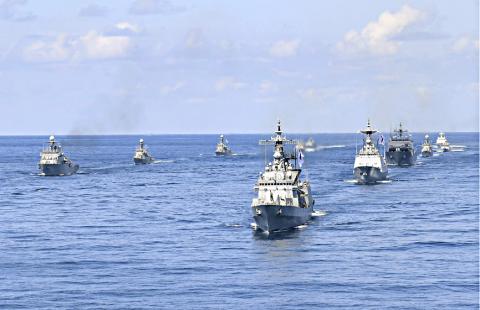South Korean forces yesterday began two days of expanded drills around an island also claimed by Japan, prompting a protest from Tokyo only days after Seoul said it would scrap an intelligence-sharing pact with its neighbor amid worsening relations.
Tokyo and Seoul have long been at loggerheads over the sovereignty of the group of islets called Takeshima in Japanese and Dokdo in Korean, which lie about halfway between the East Asian neighbors in the Sea of Japan, which South Korea insists should be called the East Sea.
The latest military drills included naval, air, and army forces, as well as marines, a South Korean Ministry of Defense official said.

Photo: EPA-EFE / South Korea Navy handout
The Japanese Ministry of Foreign Affairs called the drills “absolutely unacceptable” and said it had lodged a protest with South Korea calling for them to end.
The island is “obviously an inherent part of the territory of Japan,” Asian and Oceanian Affairs Bureau Director-General Kenji Kanasugi told the South Korean embassy in Tokyo in a statement.
Ko Min-jung, a spokeswoman for South Korea’s presidential Blue House, said the drill was an annual exercise and not aimed at any specific country.
“It’s an exercise to guard our sovereignty and territory,” she told reporters in Seoul.
The exercise included significantly more South Korean forces than previously involved and spanned a wider area in the sea between South Korea and Japan, a South Korean navy official said.
For the first time the drills included an Aegis-equipped destroyer and army special forces, the official said, speaking on condition of anonymity because of the sensitivity of the issue.
The disputed islands have long been one of the most sensitive areas of contention between Japan and South Korea.
A detachment of South Korean guards has been stationed there since the 1950s and South Korea has conducted annual defense drills in the area.
Tokyo accuses South Korea of occupying the islands illegally.
The South Korean Navy said the drills were designed to underscore its commitment to defending the broader area.
“The military has changed the name of the drills to ‘East Sea Territorial Protection Exercise’ reflecting the scale and meaning of the drills to solidify the military’s resolve to protect the territory in the East Sea,” the navy said in a statement.
Previous drills had been called the “Dokdo Defense Exercise.”
Additional reporting by AFP

CHAOS: Iranians took to the streets playing celebratory music after reports of Khamenei’s death on Saturday, while mourners also gathered in Tehran yesterday Iranian Supreme Leader Ayatollah Ali Khamenei was killed in a major attack on Iran launched by Israel and the US, throwing the future of the Islamic republic into doubt and raising the risk of regional instability. Iranian state television and the state-run IRNA news agency announced the 86-year-old’s death early yesterday. US President Donald Trump said it gave Iranians their “greatest chance” to “take back” their country. The announcements came after a joint US and Israeli aerial bombardment that targeted Iranian military and governmental sites. Trump said the “heavy and pinpoint bombing” would continue through the week or as long

TRUST: The KMT said it respected the US’ timing and considerations, and hoped it would continue to honor its commitments to helping Taiwan bolster its defenses and deterrence US President Donald Trump is delaying a multibillion-dollar arms sale to Taiwan to ensure his visit to Beijing is successful, a New York Times report said. The weapons sales package has stalled in the US Department of State, the report said, citing US officials it did not identify. The White House has told agencies not to push forward ahead of Trump’s meeting with Chinese President Xi Jinping (習近平), it said. The two last month held a phone call to discuss trade and geopolitical flashpoints ahead of the summit. Xi raised the Taiwan issue and urged the US to handle arms sales to

State-run CPC Corp, Taiwan (CPC, 台灣中油) yesterday said that it had confirmed on Saturday night with its liquefied natural gas (LNG) and crude oil suppliers that shipments are proceeding as scheduled and that domestic supplies remain unaffected. The CPC yesterday announced the gasoline and diesel prices will rise by NT$0.2 and NT$0.4 per liter, respectively, starting Monday, citing Middle East tensions and blizzards in the eastern United States. CPC also iterated it has been reducing the proportion of crude oil imports from the Middle East and diversifying its supply sources in the past few years in response to geopolitical risks, expanding

Pro-democracy media tycoon Jimmy Lai’s (黎智英) fraud conviction and prison sentence were yesterday overturned by a Hong Kong court, in a surprise legal decision that comes soon after Lai was jailed for 20 years on a separate national security charge. Judges Jeremy Poon (潘兆初), Anthea Pang (彭寶琴) and Derek Pang (彭偉昌) said in the judgement that they allowed the appeal from Lai, and another defendant in the case, to proceed, as a lower court judge had “erred.” “The Court of Appeal gave them leave to appeal against their conviction, allowed their appeals, quashed the convictions and set aside the sentences,” the judges